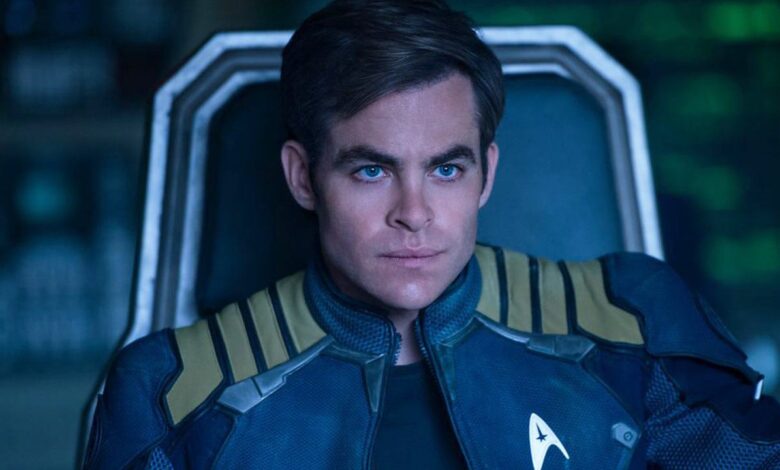Whatever Happened to Star Trek 4?

Eight years.
That’s how long it’s been since we last got a new Star Trek movie (with 2016’s Star Trek Beyond). A follow-up, Star Trek 4, has been much reported on during those eight years, but it remains nowhere near being made, let alone released. It’s like we’ve been stuck in the Guardian of Forever all this time, and the situation raises one big question: What’s the holdup?
Meanwhile, the news broke this week that a new Star Trek prequel film is in the works from director Toby Haynes (Andor) and writer Seth Grahame-Smith (Abraham Lincoln, Vampire Hunter), but that it is unrelated to Star Trek 4. So Paramount is gearing up for a different Trek movie when they can’t even get Trek 4 off the ground? Hmmm…

Looking at the 45-year history of Star Trek on the big screen, we see that the first four William Shatner-led films were produced and released over the course of seven years (from 1979 to 1986), while the entire run of six movies from The Motion Picture in 1979 to The Undiscovered Country in 1991 happened over a span of 12 years. All four Patrick Stewart/Next Generation pictures were made over the course of eight years (from Generations in 1994 to Nemesis in 2002). And the Chris Pine reboot series might’ve slowed things down some after its 2009 debut, but still managed to do three movies in seven years.
But that brings us back to Star Trek 4, the untitled and presumed capper to the Pine iteration of the franchise. The last time fans have gone this long without a new Star Trek movie was… well, before there was such a thing as Star Trek movies. There’s even a whole Wikipedia page devoted to just the “development of Star Trek 4.”
The first tangible chatter about Star Trek 4 came during Star Trek Beyond’s promotional push. Producer J.J. Abrams – who had relaunched the franchise as the director of the 2009 film as well as its follow-up, Into Darkness – revealed that a fourth film was being planned that would see Pine’s Captain Kirk reunited with Chris Hemsworth’s George Kirk, playing off of Hemsworth’s small but pivotal role in the 2009 movie as the famed Enterprise captain’s father, not to mention his subsequent Marvel fame. (Years later we’d learn that the premise of the Pine/Hemsworth story was “Indiana Jones and the Last Crusade in space.”)
Was that tease just pre-release hype by Abrams intended to get folks excited for Beyond? It’s impossible to say, of course. But considering that Beyond made about a hundred million dollars less than its predecessor, Into Darkness, at the worldwide box office, and didn’t even break $200 million domestically, it’s no surprise that not much was heard about the proposed fourth film for some time after that. Still, by 2018 there were reportedly three different scripts in development for a potential Star Trek 4, and one of them was coming from none other than Quentin Tarantino.
Eventually we would learn that Tarantino was a bit unclear on the difference between the Abrams films and The Original Series from the 1960s, specifically the fact that they exist in different timelines. (“I don’t buy that,” he said on the Happy Sad Confused podcast in 2019. “I don’t like it. I don’t appreciate it. I don’t… fuck that! Alright? I don’t like that.”) The Revenant’s Mark L. Smith was hired to write the film and Tarantino considered directing it, but eventually he opted out and the project seemed to lose steam at Paramount. We can only hope that it at least got made in an alternate timeline.
In April of 2018, S.J. Clarkson was hired to direct Star Trek 4. As the first female director of a Trek feature film, this was a notable milestone. Alas, her take on the USS Enterprise was not to be either. By August of that year, reports indicated that talks between the studio and Pine and Hemsworth had broken down (essentially, Paramount didn’t want to pay Marvel or DC bucks for the under-performing Star Trek). In January 2019, Trek 4 was reported to be cancelled and Clarkson moved on to direct the pilot for one of HBO’s Game of Thrones prequels. (That pilot, which starred Naomi Watts, was reportedly shot, but the series never got the greenlight. Don’t worry though: Clarkson is finally making her feature directorial debut with Madame Web next month.)
Much of Star Trek 4’s woes kind of come down to the Hollywood that has evolved over the past 16 years since the first MCU movie was released.
Like Spock on Planet Genesis, Star Trek 4’s development returned from the grave soon enough though. Noah Hawley (Fargo, Legion) signed on to write and direct the film in late 2019, and intriguingly, his pitch didn’t include Kirk or Picard. But it didn’t matter because by 2021 Hawley was also off the project and Matt Shakman, hot off of Wandavision, was on. And… by 2022 Shakman was out, off to direct Fantastic Four for Marvel.
Indeed, much of Star Trek 4’s woes kind of come down to Marvel, or at least the Hollywood that has evolved over the past 16 years since the first MCU movie was released. Simon Pegg kinda nailed it when talking to GamesRadar+ and Total Film a couple of years back:
“The fact is, Star Trek movies don’t make Marvel money,” said Pegg, who stars as Scotty in the Abrams reboot series (and co-wrote Beyond). “They make maybe $500 [million] at the most, and to make one now, on the scale they’ve set themselves, is $200 [million]. You have to make three times that to make a profit.”
It’s true that Star Trek movies traditionally don’t play well internationally. Anecdotally, looking at Star Trek Into Darkness and Thor: The Dark World, both of which were released in 2013, we see that they each made in the low $200 million range domestically, but internationally Thor did about $200 million more than Star Trek. And The Dark World isn’t exactly considered one of Marvel’s crowning achievements…
It’s been said before but another part of the equation could just be that Star Trek’s true home is on the small screen, where it all began. Say what you will about the various Trek series that Paramount+ has put out over the past six years since Star Trek: Discovery debuted, but the type of stories and formats that we’ve experienced on Disco, Picard, Strange New Worlds, Lower Decks, and Prodigy has certainly been wide and varied. (Michelle Yeoh will also be starring in the first made-for-TV Star Trek feature, Section 31.) A feature film designed to hit four quadrants and deliver action and spectacle doesn’t always go that well with, say, a philosophical debate on the rights of a pre-warp species, ala Captain Picard. And a successful TV series doesn’t need to be transformed into a successful movie series, or vice versa. (This may be a lesson that Marvel themselves are learning the hard way right now.)
And by the way, it’s not like Star Trek as a franchise is in dire straits right now. The franchise had a great year in 2023 with the breakout success of Picard Season 3 and Strange New Worlds Season 2. The franchise may be facing some contraction on the small screen, but that’s mostly due to an industry-wide reaction to the glut of the streaming landscape. But the question must be asked: Why don’t the suits at Paramount corporate get their movie and TV Treks better aligned? Patrick Stewart has said a script is being written to bring back Picard in one more movie, and the animated possibilities of the franchise are ripe for continued mining. Many fans have been waiting for an Avengers-style crossover between the different TV shows; surely some kind of hybrid theatrical/streaming release would make perfect sense from a [fights back vomiting] synergistic perspective.
There’s also the J.J. Abrams factor. As the head of Bad Robot Productions, the mega-filmmaker has had the keys to Star Trek’s big-screen fortunes ever since he directed the 2009 reboot. And as active as he is as a producer, Abrams certainly seems to be taking his time these days on deciding what his next directing project will be. Did the experience of making 2019’s Star Wars: The Rise of Skywalker – his most recent directorial outing – affect him in some way? Sure, the movie made a bunch of money, but it’s safe to say that the Star Wars Sequel Trilogy was, at best, a wash in the end. Perhaps Abrams has grown phaser-shy these days, and that has also impacted the development process of Trek 4 at Bad Robot.
So whatever happened to Star Trek 4? Hollywood happened to Star Trek 4. They didn’t stop making William Shatner movies because William Shatner was done. They stopped because the studio thought they could get more bang for their buck out of the younger Next Generation cast. And when the time came, they didn’t stop making Patrick Stewart movies because Patrick Stewart was done. If his last film, Nemesis, was a hit, you can be sure the studio would’ve trotted out Picard and the Enterprise-E one more time.
Maybe the Chris Pine films have just run their course and it’s taken Paramount eight years to figure that out. If that’s the case, this newly announced prequel – which is said to take place decades before Kirk’s time – could be just what the franchise needs: a fresh start. But perhaps the studio also needs to consider what a Star Trek movie release even looks like these days – theatrical, streaming-only, hybrid, or otherwise. Spock was big into “infinite diversity in infinite combinations.” Paramount could stand to take a cue from the old Vulcan.
Talk to Executive Editor Scott Collura on Twitter at @ScottCollura, or listen to his Star Trek podcast, Transporter Room 3. Or do both!


